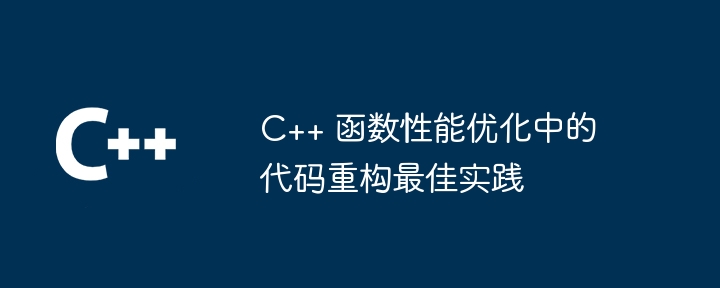
Code refactoring can optimize C function performance. Best practices include: 1. Identify time-consuming hot functions; 2. Eliminate code duplication; 3. Reduce temporary objects; 4. Inline small functions; 5. Optimize data structures ;6. Eliminate exceptions; 7. Avoid unnecessary copying. For example, the optimized function sum() uses a mathematical formula to calculate the sum, eliminating the overhead of loops and temporary object allocation.

Code refactoring is a key step to improve function performance. It can simplify the code structure. Remove unnecessary overhead. Here are some best practices for refactoring C functions to optimize performance:
1. Identify hot functions:
Use performance analysis tools to identify the longest-running functions in your code . Start refactoring from these functions.
2. Eliminate code duplication:
Duplicate code will increase runtime overhead. This overhead can be eliminated by extracting duplicate code into functions or macros.
3. Reduce temporary objects:
Creating and destroying temporary objects will reduce performance. Try to avoid using temporary objects and use references or pointers instead.
4. Inline small functions:
For very small functions (for example, containing only a few lines of code), inlining them into the caller can eliminate the overhead of function calls.
5. Optimize data structure:
The choice of data structure will have a significant impact on performance. Depending on the behavior of the function, choose the most appropriate structure, such as an array, vector, or hash table.
6. Eliminate exceptions:
Exception handling overhead is very high. If possible, avoid using exceptions and instead return error codes or use other error handling mechanisms.
7. Avoid unnecessary copying:
Unnecessarily copying data will waste time and memory. Use move semantics or references to avoid unnecessary copies.
Practical case:
Original code:
int sum(int n) {
int total = 0;
for (int i = 0; i < n; i++) {
total += i;
}
return total;
}Optimized code:
int sum(int n) {
return n * (n + 1) / 2;
}The optimized code uses mathematical formulas to calculate the sum, eliminating the overhead of loops and temporary object allocations, thereby improving performance.
The above is the detailed content of Best practices for code refactoring in C++ function performance optimization. For more information, please follow other related articles on the PHP Chinese website!
 What are the differences between c++ and c language
What are the differences between c++ and c language
 Recommended learning order for c++ and python
Recommended learning order for c++ and python
 Cost-effectiveness analysis of learning python and c++
Cost-effectiveness analysis of learning python and c++
 Is c language the same as c++?
Is c language the same as c++?
 Which is better to learn first, c language or c++?
Which is better to learn first, c language or c++?
 The difference and connection between c language and c++
The difference and connection between c language and c++
 C++ software Chinese change tutorial
C++ software Chinese change tutorial
 Cost-effectiveness analysis of learning python, java and c++
Cost-effectiveness analysis of learning python, java and c++




